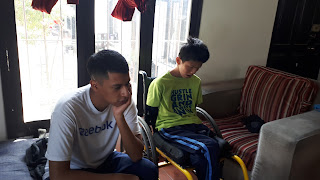Last February we received an email from our friend, Daryl Fulp, asking if we would ever consider accepting another resident who was currently in Coban. Their ministry, Hope for Home, had been providing diapers and formula for a 22 year old young man named Josué who was being cared for by his mother. Unfortunately, she fell and broke her hip, went to the national hospital for care, and died while there, leaving Josué an "orphaned adult." His needs far exceeded those of our other residents, but his situation was desperate, so we agreed to visit him.
Josué was being "cared for" by an elderly friend of his mother and her developmentally disabled son. Though I believe this 73 year old lady did the best she could with Josué, the condition we found him in was horrible. He was severely malnurished, lying in a urine soaked bed, with a wash cloth tucked in his mouth.
Upon meeting Josué we discovered that he was also blind. Immediately I remembered a young girl I worked with who appeared to have autism but after being stimulated and educated quickly lost those symptoms. I had hope that this would be the case for Josué, though bringing him into Casa de Esperanza would require significant adjustments from our staff.
We knew, however, that we could not leave him where he was, and feared that if we reported his condition to local authorities, he would be placed in an institution where his situation would be the same, or even worse. Both Dani, our resident director who accompanied me to Coban, and I agreed we would take him home with us.
To say the transition was challenging is an understatement. When Josue arrived, he had no way of knowing what was in store for him, or if he could really trust us. In addition, he was now living in a household with 6 other residents, and a lot of resulting movement and noise he was not accustomed to having. He would frequently strike his head or face with his fists, and screech. He was difficult to callm, and did not sleep well. Our staff had to go over an above in caring for him, yet never once complained about his presence. They are remarkable young men.
With time and familiarity, as well as the advice of a friend who has worked for years with deaf/blind clients, we were able to orient Josué to our home. We learned quickly that while he did not speak, he understood everything that was said to him, although Spanish was his second language. (His area of Guatemala speaks a Mayan language and this is what was spoken in his home).
We soon found out that he could eat solid foods if they were cut in small enough pieces, and he quickly learned to chew. We introduced him to Coke, and we exuberant when his first word spoken to us was "coca." (Thanks to Moises' excellent tutoring skills!)
Today, after six months with us he is a different young man. He loves our animals and seeks them out, locating our cats by their purring. He is beginning to walk with a walker, sleeps well, and no longer feels the need to hit himself in frustration.









No comments:
Post a Comment